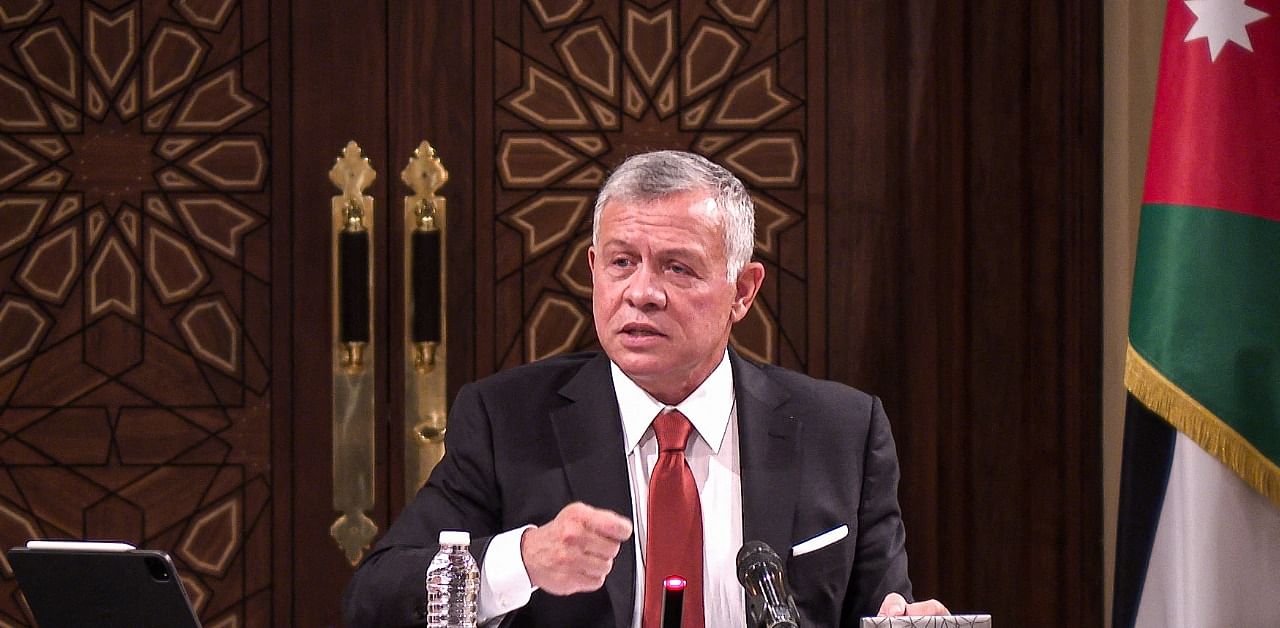
Jordan will mark 100 years of survival Sunday as a resource-poor country in a war-ravaged neighbourhood, but the worst palace crisis in decades and the coronavirus pandemic threaten to overshadow any celebrations.
"Nobody would have bet a dinar on the survival of the state, created in the desert and with almost no natural resources," said Jalal al-Husseini, a researcher at the French Middle Eastern studies institute IFPO in Amman.
On April 11, 1921, Abdullah became ruler of the newly created Emirate of Transjordan.
The territory accorded him by colonial power Britain had little oil and severely lacked water, and it has since seen repeated wars on its borders, prompting three waves of refugees -- yet has managed to survive.
But there was palace turmoil barely a week before the anniversary, as a former heir to the throne was suddenly confined to his palace, accused of plotting to "undermine the security" of the kingdom.
Days later, under family pressure, Prince Hamzah signed a statement pledging loyalty to his half-brother, King Abdullah II, who had stripped him of the title of crown prince in 2004.
But even before the palace crisis, plans for centenary celebrations were muted due to Covid-19.
"Economic and social conditions, the health situation and day-to-day life are very difficult, so there's not much enthusiasm to mark this as we should," said Oraib al-Rantawi, head of Al-Quds Center for Political Studies.
"We are talking about a state that was born on the fault lines of all the struggles and wars in the region, so its emergence and survival for 100 years with few resources is quite an achievement."
Transjordan, formed alongside Palestine during British mandate, declared full independence in 1946 and became the Hashemite Kingdom of Jordan under Abdullah.
Along with Iraq, it was one of two independent kingdoms that Britain established under the rule of the Hashemite dynasty, whose support it had enlisted in the Arab revolt against Ottoman rule during World War I.
In a show of the fragility of the arrangement, the Iraqi arm of the dynasty was overthrown in a republican coup in 1958, in which King Faisal II and nearly all of his family were killed.
In 1948, Jordan faced its first major crisis with the establishment of the state of Israel next door, a move that sent hundreds of thousands of Palestinians fleeing into its territory.
Abdullah imposed his rule over both sides of the Jordan River after Israel won the first Arab-Israeli war in 1948.
In 1949, he annexed what is now the West Bank, gave its inhabitants citizenship and one year later declared unity of the two banks under his crown.
Abdullah was assassinated by a Palestinian in July 1951, and his grandson Hussein, father to both the current king, Abdullah II, and to Prince Hamzah, ruled from 1952-99. He survived several attempts on his life.
The kingdom aimed to integrate the Palestinians and have them take part in modernising Jordan, but the emergence of the Palestine Liberation Organisation (PLO) in 1964 and birth of a Palestinian national identity brought an end to this "unity".
Three years after Israel's occupation of the West Bank in its crushing victory over Arab armies in the Six-Day War of 1967, tensions burst onto the streets in a 10-day conflict known as Black September, when King Hussein deployed troops to crush the PLO's growing power.
Almost two decades later, in 1988, Jordan officially cut administrative ties with the West Bank and withdrew citizenship from Palestinians in the West Bank.
"In 1950, overnight, we had become Jordanians, then overnight in 1988 we lost our citizenship," said one West Bank Palestinian who declined to be identified.
In 1994, a year after the PLO signed the Oslo autonomy accords with Israel, Jordan inked its own peace deal with the Jewish state.
Abdullah II took the throne in 1999 under the mottos "Jordan first" and "We are all Jordanians", to cement a national identity.
His wife Queen Rania, like nearly half the kingdom's 10 million residents, is of Palestinian descent.
The right, which has grown to dominate Israeli politics over the past decade and a half, has long dreamed of making Jordan a replacement Palestinian homeland to avoid having to partition historic Palestine.
"The kingdom is obsessed with survival, stability -- and most of all preventing the country from becoming a substitute Palestinian state," IFPO's Husseini said.
Soon after, strife elsewhere in the region created new challenges for the kingdom.
When a US-led coalition toppled Iraqi dictator Saddam Hussein in 2003, Jordan saw an influx of hundreds of thousands of refugees from its eastern neighbour, and at least 700,000 Syrians have followed since their country's civil war broke out in 2011.
Yet the state has weathered those storms too.
Mansour al-Mualla, a farmer and political activist with the Jordanian National Movement, said the kingdom's role in "preserving security and stability in the region", as well as counter-terrorism operations, were key to its survival.
"Iraq sees Jordan as an important tool for it to escape Iranian influence, Syria sees it as a partner in its future reconstruction, and the Palestinians see it as essential to their nation-building project," the 41-year-old said.